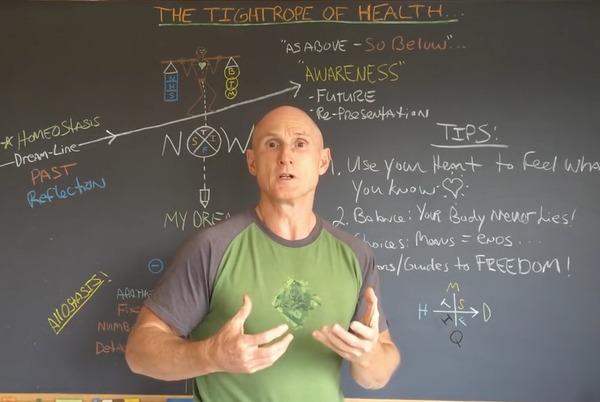Managing Sleep Challenges
by Paul Chek

It’s a huge challenge for so many people, particularly younger folks, to manage the essentials — getting adequate rest, eating high quality food and drinking enough water — just to maintain the proper balance between outgoing and incoming energy resources they need to be healthy.
During my recent six-part Fastest Way to Health video series, a college student described his struggles with sleep discipline in the YouTube comments section and asked for some suggestions on how to build better sleep hygiene habits.
In an effort to address this major challenge so many young people face today to their overall health, I wanted to share my response to a wider audience here on the CHEK Blog.
MBsavage: Hello Paul. First and foremost, I hope you are having an amazing week and the love you are giving to the world is coming back at you tenfold! Love this Fastest Way To Health series and your work in general as it is very practical and usually easy to implement.
I’ve been “blessed” with good sleep, even with my terrible sleeping habits. I’m in college and often burn the midnight oil to prepare for an exam or finish an assignment I forgot about.
I haven’t had any problems such as waking up at night or feeling groggy. I’m usually very aware during the day, and I do get around eight hours, mostly a little under though. My problem is even when I’m not in school, I lack the discipline to get my butt into bed at 10 p.m.
I’ve been consistent for short periods of time in the past, say one month or so, then something triggers me to sleep later. I love watching educational videos online like I’m doing now and documentaries at night and feel going to bed is a chore which sounds strange but it’s how I feel.
I tried to make it fun by practicing lucid dreaming, but lacked the willingness to keep it up. I’ve heard you mention you practice it as well (a fun idea for a future video perhaps?).
So, I guess my question here is how does one create the willingness and the commitment to practice good sleeping habits and make them a part of his/her value system?
Being young
You are young, so there is a lot of energy running through you, as is the case with most youthful people who are reasonably healthy. With this energy comes a natural desire to explore, learn, grow and “become.”
When we are young, we are in a quest for “meaning making” in life. This deep and, often, unconscious desire propels us in our search to find who we are, and what we came to the world to learn and share.
Your exuberance is natural, but if it isn’t managed, challenges can occur.
Managing your energy resources
Human beings are living biological organisms, thus, there are essential requirements for the accumulation of energy and resources (food, nutrition, water, movement, sun, breathing) to keep the body vital and resistant to illness and disease.
As an analogy, imagine that, like a cell phone, you have a finite amount of battery power. As long as the battery has enough power to run the systems and programs that make it functional, it is a working tool we can use.
As I suspect you’ve found, if the power in your phone battery reaches a critically low level, the programs and systems in it begin to fail.
The same is true for any biological organism, except that living human beings have a need for hydration, nutrition, sleep, movement, breathing and related essentials, not just energy (like a phone).
As you live each day, you use a fixed amount of energy and resources. If the energy and resources you use aren’t replaced through effective self-management each day, a deficit starts to build.
Very soon, you’ll become like a cell phone that was run down through daily use but wasn’t put on the charger long enough to build up enough energy to meet the demands of your typical daily use.

So, you start finding that later in the day, your phone starts dropping calls, and programs start hanging up because energy levels are critically low.
The same is true with the human body, but you are likely to experience this as a loss of creativity and cloudy thinking. That’s when many people reach for stimulating drinks and fast foods, quick, easy and processed energy-boosters that deplete your body.
If this goes on, you will eventually start having bodily challenges, such as headaches, aching muscles and joints, and niggling injuries that won’t heal.
Dream management
When you are clear with yourself as to what it is that you specifically desire to become or create in your life, your heart and mind focus on achieving those objectives.
This drive can be so motivating that people fall in love with their “doings” and start pushing themselves into progressive stages of fatigue and depletion, all the while powered by the inspiration and love of creating their dream.
There comes a point, however, where this “low battery” condition becomes an impediment to dream creation, and a variety of blocking factors begin to emerge.
This is where the appearance of “The Pain Teacher” comes into play. By hook or crook, we come to realize that to be an effective creator and contributor in the world, we have to invest the love, time and energy into our bodies (with the understanding that it is our chief tool of creative self-expression) to support the dream creation process optimally.
This requires awareness of, and constant connection to, the 4 Doctors within each of us.
Therefore, it’s a matter of learning how to live fully and do the self-management work necessary to fully express yourself in the world. The alternative is learning the hard way by constantly diminishing yourself, which often leads to a string of aborted efforts and “I wouldas/shouldas/couldas.”
These are the words of a child whose parents don’t effectively manage him/her, and let the child stay up late playing video games and eating junk food, not the words of an adult with clear intentions to add beauty to the world.
Love and chi,
Paul



